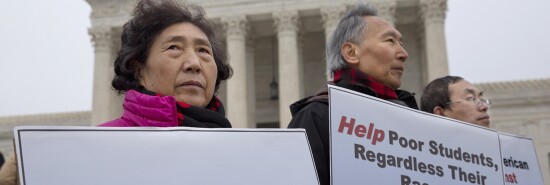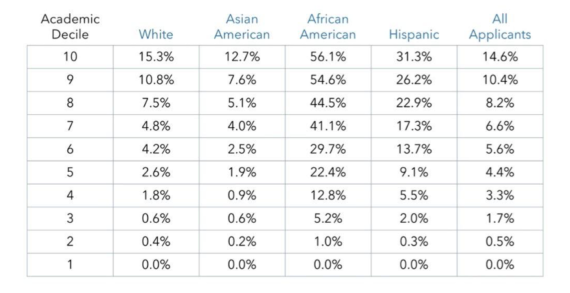
Of course affirmative action harms Asian Americans
Jack Elbaum
Video Embed
The debate over using race as a factor in college admissions decisions — euphemistically referred to as affirmative action — is about to take center stage when the Supreme Court releases its decision on the issue later this summer. In all likelihood, the court will rule that the policy, used by universities across the country, violates the 14th Amendment and the Civil Rights Act.
Eighty-two percent of Americans understand that it is common sense not to make admissions decisions based on race, including 84% of whites, 81% of Hispanics, 76% of Asians, and 71% of blacks, according to a new Pew Research poll. The reason is simple: advantaging some people at the expense of others on the basis of race is wrong.
GAVIN NEWSOM’S CAMPAIGN TO REPEAL THE SECOND AMENDMENT
There was likely a temporary period, in the aftermath of the civil rights movement, when it would be prudent to take race into account in college admissions. But, as I said, that period was transient — as it would have represented a necessary exception to our baseline principle — and it has certainly passed by.
Even so, two professors took to the pages of the LA Times yesterday to try and explain away what everybody already knows. In a piece titled “Affirmative action isn’t hurting Asian Americans. Here’s why that myth survives,” Janelle Wong and Viet Thanh Nguyen argue that the existence of an “Asian American penalty in college admissions” — which has been used as the pretext for the Supreme Court case in the news right now — is actually a myth.
This is a bold claim that would require significant evidence to prove. However, in their piece, no evidence whatsoever is provided.
Instead, it is filled with suggestions that the SAT is racist and not an accurate indicator of merit, along with an implication that the man who brought the lawsuit is not to be trusted because he is white.
The closest they get to bringing in their own data — which they do not do — is an attempt to “debunk” one of the studies demonstrating the double standard in test scores. They argue that data showing Asians need to score 140 points higher on the SAT than whites, 270 points higher than Hispanics, and 450 points higher than blacks, to have the same odds of admission is “quite misleading.” Why? Not because there was anything wrong with the data set, but “Because the analysis does not include key elements in admissions files, including letters of recommendation and essays.”
The implication of their claim is untenable. There is simply no reason to believe taking into account letters of recommendation and essays could possibly close the gap of literally hundreds of points. The authors do not even try to provide an argument that it would. What we are left with, then, is significant reason to believe Asian Americans are held to a higher standard in admissions. We can assume much of this has to do with racial preferences as a policy because the gaps in necessary test scores are much less severe when it comes to class than they are with respect to race.
The authors write that most statements on test score differentials are based on the study just discussed. However, there is certainly more data that leads us to similar conclusions.
A chart compiled by Students for Fair Admissions — which is the group that brought the case about to be decided by the Supreme Court — finds that “an Asian American in the fourth-lowest [academic] decile has virtually no chance of being admitted to Harvard (0.9%); but an African American in that decile has a higher chance at admission (12.8%) than an Asian American in the top decile (12.7%).

Additionally, Asian Americans are the only racial group to have a lower likelihood of admission in every single academic decile relative to “all applicants.” The deciles were created using Harvard’s own index created based on test scores and GPA.
CLICK HERE TO READ MORE FROM THE WASHINGTON EXAMINER
Once again, these are gaps so significant they cannot simply be charted up to not including “key elements in admissions files, including letters of recommendation and essays.”
The data seem to be clear. Asian Americans are certainly held to a higher standard in college admissions. Does this constitute “harm”? Well, in a world where “silence is violence,” I would assume that racial discrimination is at least considered “harm.”
Jack Elbaum is a summer 2023 Washington Examiner fellow.
